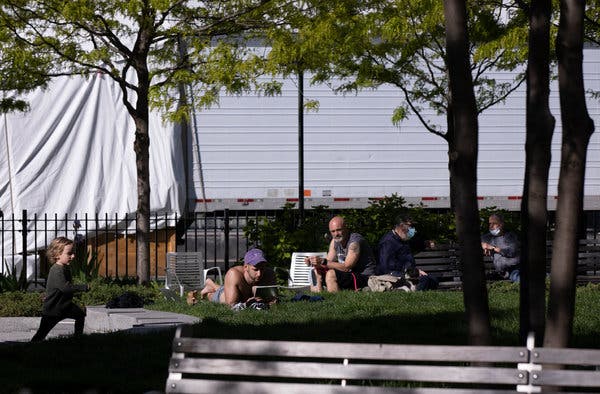It was nearly two months ago when the first white refrigerated trucks began to appear on the streets of New York City. They were meant as a temporary solution to help overwhelmed hospitals and morgues house the bodies of people who had succumbed to Covid-19. The pandemic has now left nearly 30,000 dead in New York — and about 205 of the vehicles, sent by the Federal Emergency Management Agency or purchased by the medical examiner’s office, are stationed across the city.
Normally these trucks are used to transport refrigerated groceries. But for weeks they’ve sat outside nearly all of the city’s hospitals, in parking lots, next to parks, outside subway entrances and at four temporary morgue locations.
What happens when thousands of people die in a dense city and there’s not enough room to store their bodies? Their remains become your new neighbors.
Nearly 100,000 Americans have reportedly died from the coronavirus. While it is difficult to grasp the sheer volume of the dead, and social restrictions make it hard to mourn properly, these trucks have become a largely silent, stark reminder of those we’ve lost.
They are part of a nation in grief. Groups in dozens of states launched funeral-style protests against the government for its handling of the pandemic. Healthcare workers from Lenox Hill Hospital in New York City held a candlelight vigil on May 20. And for his part, President Trump ordered flags on all federal buildings and national monuments to half-staff over Memorial Day weekend in memory of those who have died.
Outside Wyckoff Heights Medical Center, the sound of one of the trucks could be heard whirring on the street as residents walked past. On its side, a temperature meter showed that the interior was a chilling 34 degrees. A dying bouquet of flowers was strapped to the metal barrier that closes off the truck from the street, and on the side of the container were the faintly spray-painted words “Dead Inside.”
Across the street from a Costco Wholesale store in Brooklyn, where dozens of people were waiting in line to buy groceries and household items, rows of trucks sat in a large lot.
Not every truck is filled to capacity — some can hold up to 100 bodies at a time — and others are empty. But many remain in use, green lights on and generators humming. The trucks will hold the bodies until funeral homes or crematories can accept them. Some families have chosen to keep the bodies of their loved ones there, in long-term storage, until they’re able to conduct burials in their preferred way.
As the weather improves and upstate begins to open up, New Yorkers are slowly emerging from isolation. While wearing face masks and keeping their distance, people are going for walks along city streets, grabbing groceries, riding their bikes and tanning in parks. The trucks sit in the background, symbolizing just how dramatically our reality has shifted.
Caitlin Ochs (@caitochs) is a freelance photographer based in New York. Gina Cherelus (@jeanuh_) is on the editorial staff of the Opinion section.
The Times is committed to publishing a diversity of letters to the editor. We’d like to hear what you think about this or any of our articles. Here are some tips. And here’s our email: [email protected].
Follow The New York Times Opinion section on Facebook, Twitter (@NYTopinion) and Instagram.



















